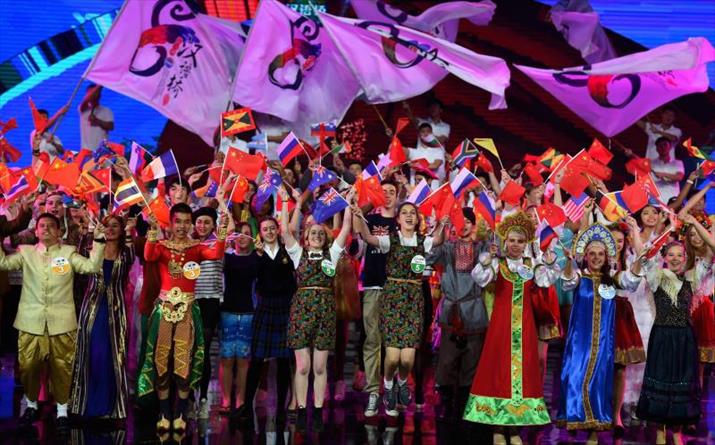| Lifestyle |
| Brought up in Beijing | |
|
|
 Prize winners celebrate after conclusion of the Eighth Chinese Bridge Proficiency Competition in Kunming, Yunnan Province, on October 31, 2015 (XINHUA)
I think I have the best of two worlds. I was born in Bangladesh, and I grew up in China, the land of Confucius and my second home. The earliest and most prominent memories of my life are from China, and Chinese is a language I have spoken since childhood. When I was just over 2 years old, my parents and I moved to Beijing. My father received an invitation from China Radio International to work as a language expert in their Bengali language department. Bengali is the official language of Bangladesh as well as one of the official languages of India. It is spoken in South Asia as well as wherever there is a Bengali community worldwide. My father told me that he always had a dream of traveling to the land of the Great Wall and understanding a nation enlightened with Confucian philosophy and teachings. This lent him the impetus to learn Chinese well enough to be able to converse in the language in as short a period as four months. I, on the other hand, got my Chinese language skills from my schools. My earliest memories, some of the warmest teachers I've come across and my first friends were all in Beijing. When I was 12, and we were about to return to Bangladesh, I couldn't let go. I felt destined to return to Beijing someday, and here I am, nine years later, studying for a bachelor's degree in Beijing under a Chinese government scholarship and reliving my childhood bit by bit. This time, I've found that China has changed a lot. Over the course of 20 years, the development has been mind-blowing. I personally have witnessed some of these changes: the new industrial revolution, the complete digitalization of life, the increase in security alongside freedom and flexibility, the growth of the entertainment industry, and especially, the advancement in international communication. The people of China have begun to include English in their daily lives and have also made efforts to bring non-Chinese into their spheres of language and culture through different Chinese language programs, TV shows, competitions and more. While I've been conversant in Chinese since childhood, I hadn't looked too far into the language until I participated in the Chinese Bridge Proficiency Competition, in which international contestants compete in Chinese language proficiency tests. I won the Best Performer Award in the Chinese Bridge Proficiency Competition for teens in 2012, as well as in the Chinese Bridge 2016 Chinese Proficiency Competition for Foreigners Across the Globe. Taking part in these competitions kindled my interest in looking deeper into Chinese culture, and I have got to know more about Chinese teachings, Confucianism and ancient Chinese culture. Chinese history encompasses a vast realm of various cultures, philosophy handed down from generation to generation, and many literary practices. Studying all this further ignited my interest in understanding Chinese people. Irene Bloom, late U.S. scholar and sinologist, explained the Confucian value system as like a tripod. One leg of it is filial devotion or filial piety; the second is humaneness; and the third, rituals or ritual consciousness. Filial piety, respect for one's parents, is considered the most fundamental of Confucian values, the root of all the others. Aside from hereditary teachings, Chinese social values range all the way from doorstep manners and family behavior to public interactions and official meetings. Their art captures an amazingly vivid image of traditional families and ethnic communities, which can be very insightful when observed closely. Personally, I am most intrigued by the traditional music. The traditional pentatonic music captures the essence of natural beauty that Chinese people treasure so much. My fellow musicians and I have been influenced by this flow while composing our own music. They also like using music with kungfu, tai chi and other indigenous martial arts, as if charging a powerful fist with emotions. The words they use to describe each detail in literature, art, music and martial arts are picturesque and self-explanatory, making one understand what these things really are. This is seen even more prominently in traditional Chinese medicine (TCM), where words like "qi," "yin yang" and "xue," which roughly translate to "energy," "balance of negative and positive," and "blood," present a revolutionary view of human anatomy. TCM makes unthinkable treatments possible, often in easier ways than most medical systems used around the world, and without side effects. These are some of the most intriguing aspects that make so many international enthusiasts choose China as the place for their studies. Remember the saying "when life hands you lemons, make lemonade?" Extending the connotation, I would like to say, when life hands you an opportunity to study in China, don't miss out on the language. It's insightful, and it's fun. That's what I have learned in my years in China. The author is a Bangladeshi student studying computer science and engineering in Beijing Copyedited by Chris Surtees Comments to yanwei@bjreview.com |
|
||||||||||||||||||||||||||||
|